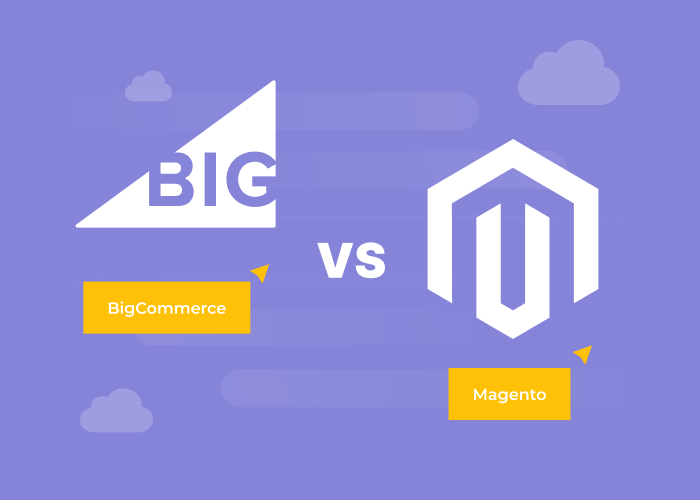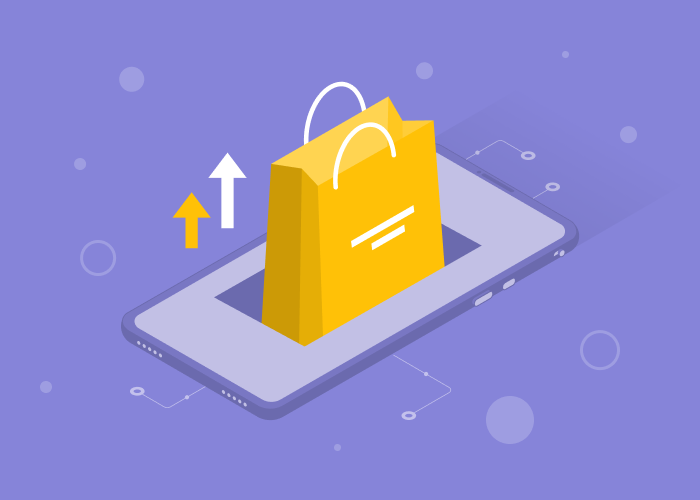Content
Ecommerce Berlin Expo: the entire ecommerce industry in one place

Machine learning and artificial intelligence, Instagram and data-driven marketing, personalization and marketplaces – these have been the trending topics at one of one of the biggest e-commerce related events, Ecommerce Berlin expo. Voice and visual search, Alexa and Google assistant dramatically change the ecommerce landscape and the customer journey. On February 15, all e-commerce leaders (including Ukrainian companies) gathered in Berlin to discuss what ecommerce will be like in 2018.
The Berlin Wall, the Berlin Film Festival, the Berlin techno clubs and the Berlin startup community – these city landmarks have recently been amplified with one more: E-Commerce Berlin Expo. The event, which took place for the third time, gathered more than 4,000 participants from the entire e-commerce sector. Since the debut in 2016, the number of visitors almost doubled.
Lets talk about itHave a project in mind?
E-Commerce Berlin Expo 2018 in figures:
- 4000+ visitors
- 120 exhibitors
- 32 speakers
- 4 stages
- 200 applications for the Berlin Ecommerce Awards
"The entire Ecommerce in one place" is the essence of E-Commerce Berlin: an international exhibition, conference and Awards for the best service providers for e-commerce. Retailers and brands, solution providers like analytics and marketing automation systems, ecommerce platforms, cross-border trade experts, industry associations and ecommerce professionals gathered to network, share experiences, meet business allies. Companies from Ukraine played an important role in this gathering, but we will save details for later.
The conference offered a compelling agenda, bringing together experts from German Zalando and Idealo, global Facebook, Google, L'Oreal, and Ukrainian Esputnik. They talked about trending technologies, personalization, automation of many kinds and machine learning.
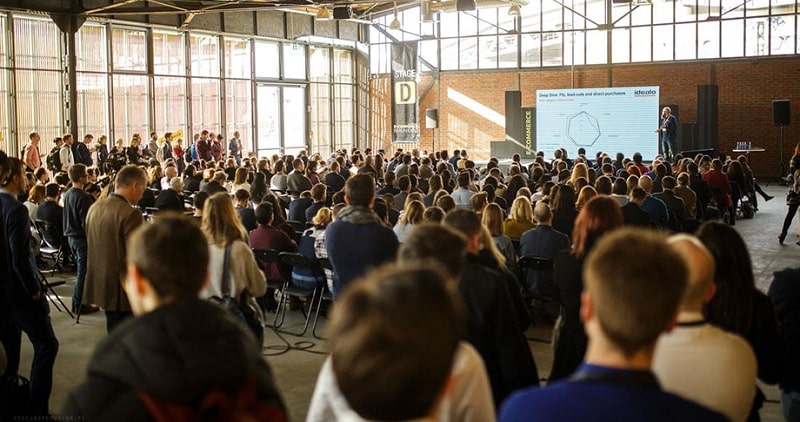
"Voice and visual" - voice commerce and image search
Claire Underwood looks in the "House of Cards" series generate hundreds of thousands of searches queries. Users are not just looking for brands and the outfits the heroine was wearing in a scene or episode, but they often want to buy the exact same Look. And this is where visual search comes to help when the text search aggravates the seeking process significantly. Pretty much the same technology which stands behind Facebook’s face recognition empowers a visual search, currently extended to three types of queries:
- Search for images through a text query. A textual input in Google Image search.
- Reverse image search by (by url or uploaded picture). The image file to be uploaded to the TinEye search engine.
- Visual search (pixel-by-pixel images comparison and search for similar visual content). The smartphone camera is used as a real-time search engine with Google lens technology.
Exactly one year ago Pinterest launched its Pinterest lens – the visual search technology. Within 12 months the tool has evolved and moved to the application’s search bar ensuring a quick search. Now the Pinterest lens processes 600 million visual requests daily. Pinterest also combined the visual and text searches in a new feature "Lens your look", encouraging users to seek inspiration for their outfits using the platform.
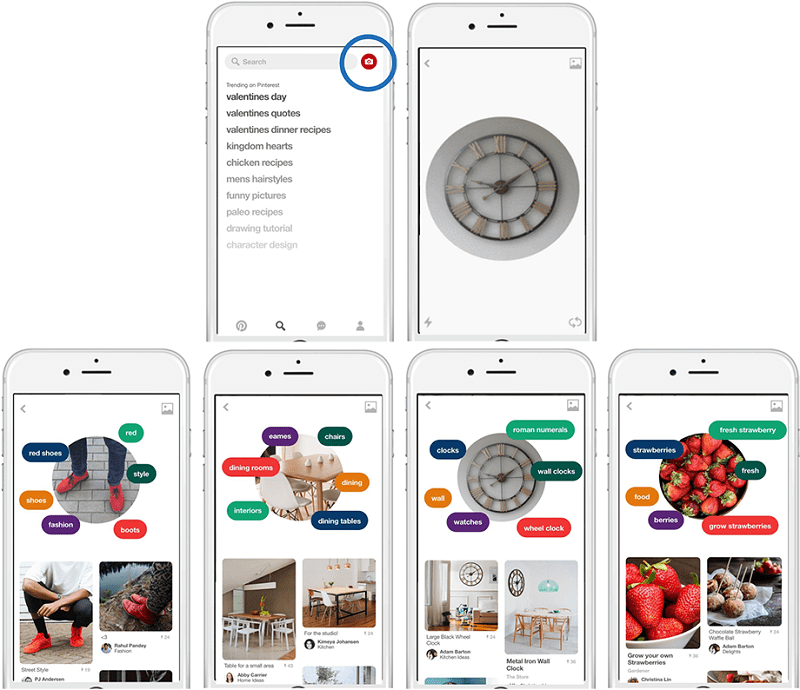
Photo credit: Pinterest Engineering
Online retailers such as ASOS, Zalando, ebay harness visual search technology for minimizing the gap between inspiration and purchase. The survey data provided by the speaker from Zalando, Tina Nord highlights the visual search technology relevance for fashion retailers, since 39% of such queries concern shoes. Perhaps this is the reason why they also call such applications "Shazam for clothes". The second popular requests category are kitchen accessories, which can be easily extrapolated to the whole interior design assortment.
Is it feasible for each brand and shop to develop their own lenses any time soon? Apparently not. But those who do not want to lag the early adopters, akin British retailer John Lewis, may already start implementing existing solutions, for example Fashwell, Slyce, EyeEm, Bllush, Mode ai.
Voice search also interferes with the customary text, challenging every online business to optimize for voice queries. Tina Nord, Team lead Content Marketing Strategy at Zalando gives recommendations on SEO optimization for voice search:
- Position one and a featured snippet are the keys.
- Focus on "long-tail" keywords.
- Optimize page speed and use AMP (Accelerated Mobile Pages).
- Do not concentrate only on Google, consider also Bing, Yahoo, etc.
- Do your own research.
Voice quires rising conversions allow us to talk about the inception of voice shopping. Voice assistants and smart home devices spread transform e-commerce inevitably.
American Walmart already offers customers the option of voice shopping through Google Home with 40 more merchants connected to google express already. In 2018, this trend will rise in Europe, so sellers better learn and adapt it now. Voice shopping is not such a distant future as it seems, but it is not a mainstream yet. According to Erik Meierhoff, Head of B2B at Idealo, only 21% of surveyed buyers have smart home devices, while only 30% among this group use them for shopping. Seems this is more of a perspective than the reality of e-commerce today.
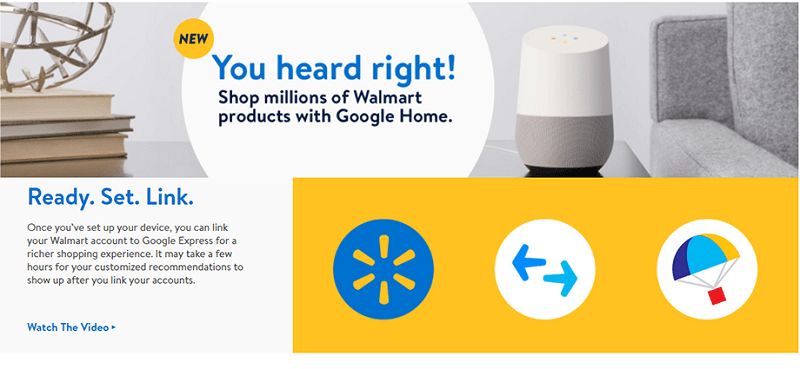
Data-driven German e-commerce market Overview
"When we talk about German e-commerce market, we must talk about Amazon" - Erik Meierhoff from Idealo, the largest German price comparison service, shared valuable insights based on data about online buyers, which they aggregate a lot in Idealo (2 billion data changes per day).
In Q4 2017, Amazon generated 1,400 million page-views in Germany, followed by eBay, which had twice less - 776 million hits. Number four by the traffic volume was Idealo - 128 million page-impressions, followed by Zalando - 50 million. At first glance, it may seem that Amazon s simple beating competitors offering the lowest price, but this is not the case. In most product categories, Amazon is more expensive than the brand's websites or even eBay. The reality of the German e-commerce market is that buyers are fanatically loyal to Amazon, and the price is often not the determining criteria. The purchase decision is influenced by additional factors, such as:
- Seller's reliability
- Delivery time
- Available Payment Methods
- Return conditions.
It is of a paramount importance for online merchants to analyze customer behavior and purchase decision-making process. The ratio of page views to purchases typically varies depending on the day of the week. The purchase making a decision in Germany has certain consistent patterns in many product categories. For instance, Monday is an “information day” when the conversion rate is minimal and Sunday is a “buying day”. Sunday is a productive day in terms of sales in electronics, fashion and accessories, cars and motorcycles segments. However, in FMCG the purchase are mostly made instantly.
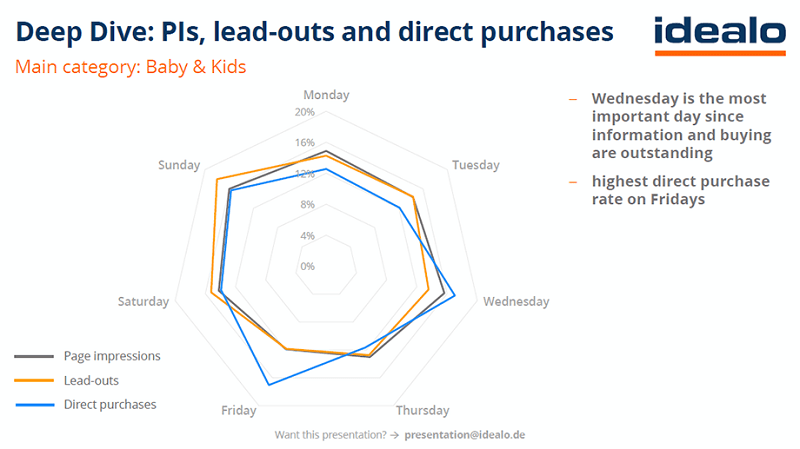
The survey conducted by Idealo also revealed an ambiguous attitude of German online shoppers towards personalization and their personal data usage.
- 56% of German buyers fear that companies know too much about them and their preferences.
- 52% do not approve that the data they leave on the website is evaluated and used for individualized offers.
However, the same 52% of users are ready to reveal their personal details, if they are offered an attractive benefit.
82% of German buyers prefer to look for information and buy on the Internet to avoid being disturbed by a salesperson.
At the same time, 36% of buyers would rather check the goods in the local store before buying it online.
Machine learning and personalization
2017 was lavishing with the technology development which affects the transformation of ecommerce. In 2018, nobody doubts the value of data for business. Today everybody wants to apply Machine learning and Data science to learn more about their customers and business. RFM analysis (Recency, Frequency, Monetary) and information clustering are one of the approaches to advanced data analysis proved its efficiency in e-retail. Pattern recognition, origin from cluster analysis, is a supreme tool for forecasting, demand prediction, and marketing planning.
How pattern recognition works in ecommerce:
- Analysis of selected customers cluster
- Building Rules for consequent Purchases
- Predicting the next purchases
"Data-driven reasoning defines thousands of hypotheses assessing them in terms of insights vital for a particular business. A human does not need to understand and justify those hypotheses - they simply reflect business realities. "- Maciej Pondel, Big Data Architect in Polish Groupa Unity.
Historical data helps marketers:
- identify new market opportunities
- accurately forecast customers’ needs
- automate marketing based on working hypotheses
- measure results and draw conclusions
Speakers emphasized the importance of segmentation not only from the data analytics standpoint but also for the user-journey optimization and customer experience enhancement.
Deniz Makura, Strategic Partner Lead Ecommerce at Google shared: "55% of regular online shoppers surveyed by Google in 2017 said that they actively prefer a personalized shopping experience". According to Gartner forecasts, this year organizations that have fully invested in all types of online personalization will outsell companies that have not by 30%. The speaker also gave an example of the Argos advertising campaign, illustrating conversion growth by 10 times through the personalization at the web-site.
Instagram Marketing and Marketing Machines
Ecommerce on the Instagram is not limited to learning the product price via direct messages as one might think. According to Daniel Kramer, Client solutions manager ecommerce & Sports at Facebook: "Instagram will play a key role in the future of mobile commerce,". He supports his statement with some data on the platform global community:
- 800 million active users globally
- 500 million daily users
- 2 million active advertisers
- 15 million registered businesses
- 300 million stories uploaded daily
- 15 million users in Germany
- 80% follow a business
- 60% learn about products on Instagram
The diverse Instagram community is rallying around their passions (Facebook’s internal term for interests). Their interests are evolving on the platform and often origin from Instagram. Daniel shared the data of 2017 user survey:
- 54% use the Instagram to follow stars updates
- 59% are seeking inspiration on luxury items
- 55% get inspiration on fashion and style
- 62% build excitement for upcoming trips
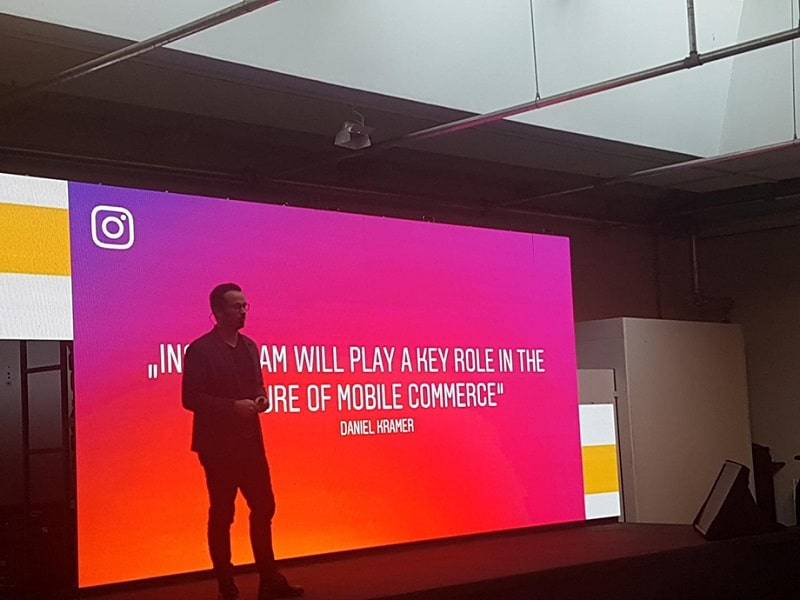
Today, Instagram is a powerful marketing tool for B2C businesses. Their full funnel solutions with super-precise targeting, according to the speaker, ensure the relevance for users, who can be targeted by:
- General Geography
- Specific Locations
- Interests
- Behavior
- Lookalikes
- Data from top partner sites
The site also offers tools for further audience customization the and various advertising campaigns. Today, Instagram actively promotes it’s full-screen immersive story ads format with Facebook retargeting. The company constantly enhances its feed and story advertising formats, namely:
-
Full-screen canvas
-
Dynamic advertising
-
Collections - carousels
Instagram developed and is already testing selectively new shoppable features integrated directly with the ecommerce sites. The goods tagged on the photo can be viewed at the detailed product view page, where the description and price are directly received from the seller's website. From there the prospects can be redirected straight away to the advertiser's checkout.
Ecommerce Berlin Expo overview has reached the final part. And it's a time for bad news. If you are a marketer, then your work might become obsolete very soon. Maybe even earlier than you wish. As Ben Harmanus, the marketing director of konversionsKraft, prophetically noted, that if computer defeated a grandmaster Garry Kasparov as long ago as in 1996, there are no doubts left regarding shortcoming automation of most marketing tasks. According to the speaker's research, the there is a high probability of certain marketing occupations total computerization, namely:
- the employees involved in statistical analysis and budget analysis can be completely replaced with 84% probability
- marketing research and surveys specialist will be eliminated next with 31% probability
Some companies (for instance, Wish) already refuse to hire marketing departments, recruiting growth specialists instead.
However, even if you aren’t a marketer, artificial intelligence is coming for you too. Today smart machines of the second economy already can do the work of the person of the average intelligence (IQ 100), according to William H. Davidov and Michael S. Malone
By 2025, according to economist Brian Arthur, 100 million people out of 150 involved in the second economy can be completely replaced by the machines.
Though, Ben Harmanus gives hope to marketers, who are ready to adapt according to T-shaped marketer paradigm (on the diagram). This approach suggests:
- Deep knowledge
- Broad knowledge
- Flexibility
- Understanding the customer journey
- Data-driven decision-making
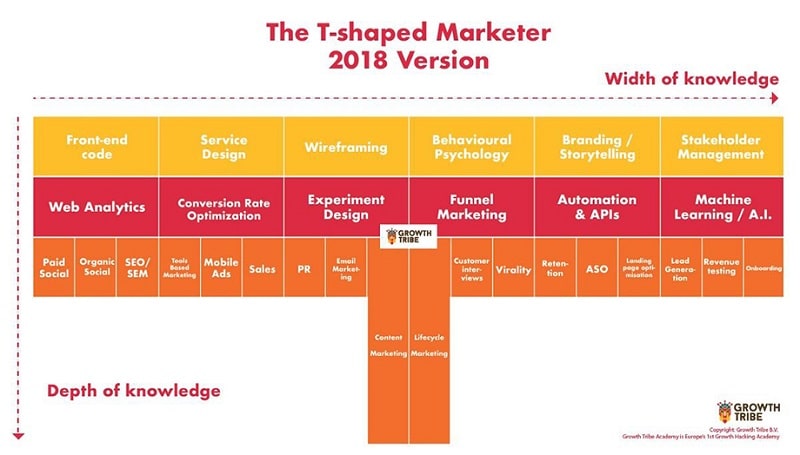
The expert also shared his list of marketing automation tools consisting of 30 items, among which he daily uses MeetEdgar, Wistia, Zapier, Unbounce, Go to webinar, Hubspot.
Ecommerce Awards
On top of all, the event launched the E-Commerce Berlin Awards this year. “The awards serve the act of recognition for e-commerce business solutions providers active on the German market. The competition registered more than 200 companies who were able to compete in 8 categories”.
In the first round, 10 companies in each nomination were selected by public voting. In the final, the expert jury carefully selected the winners. Here, Ukrainian companies surpassed numerous international competitors
Ukrainian Esputnik won the nomination "Best Customer Communication Tool"
Competing as "Best Agency of the Year" Dinarys - a company with Ukrainian roots, was among the top-three winners. The ecommerce agency with ecommerce development centers in Dnipro and Berlin competed with German, Polish and another Ukrainian agency Elogic Commerce.
On Monday, February 19 speakers from E-commerce Berlin joined the ecommerce panel. This satellite event was organized by Dinarys and SIBB, IT Association of Berlin and Brandenburg.
Let professionals meet your challenge
Our certified specialists will find the most optimal solution for your business.

